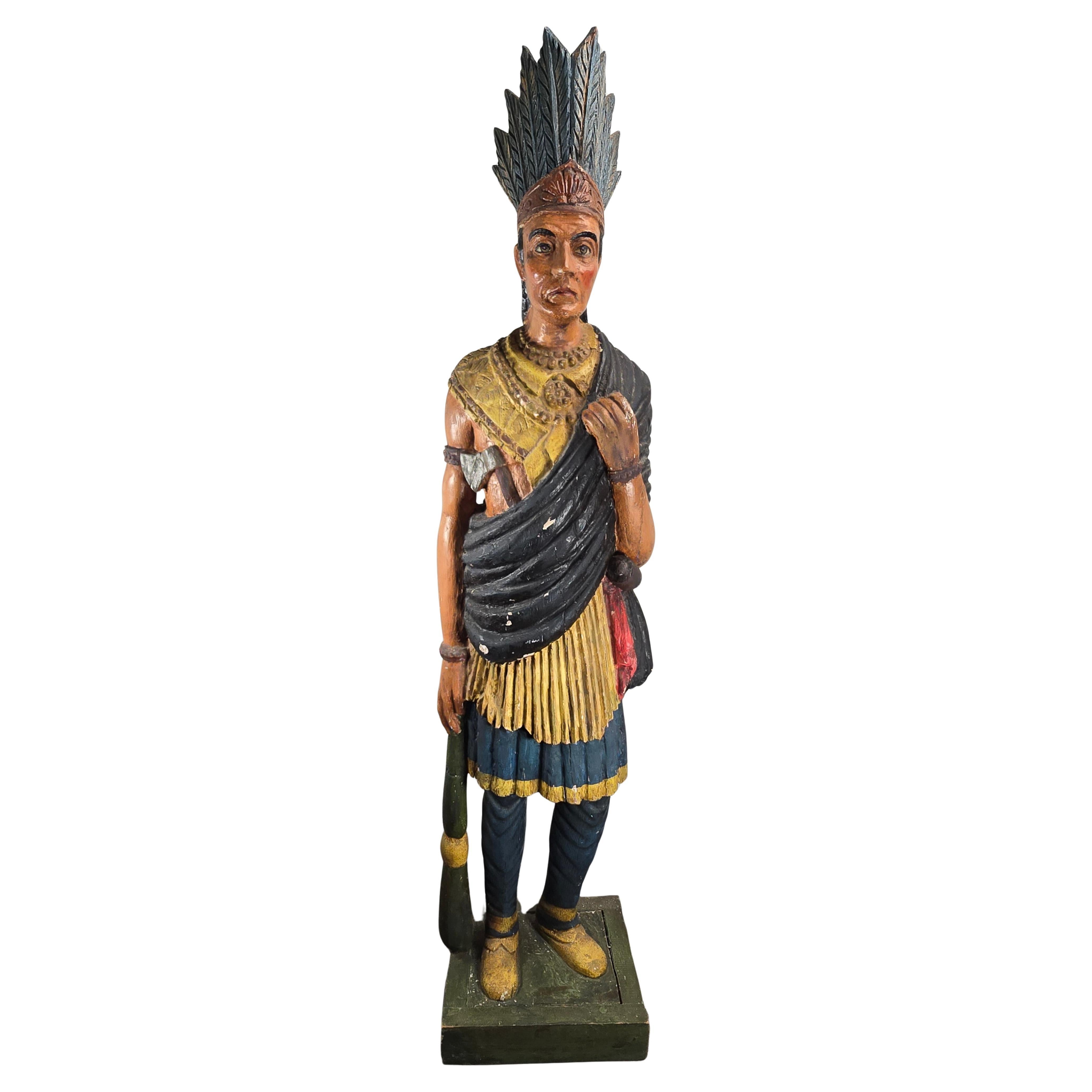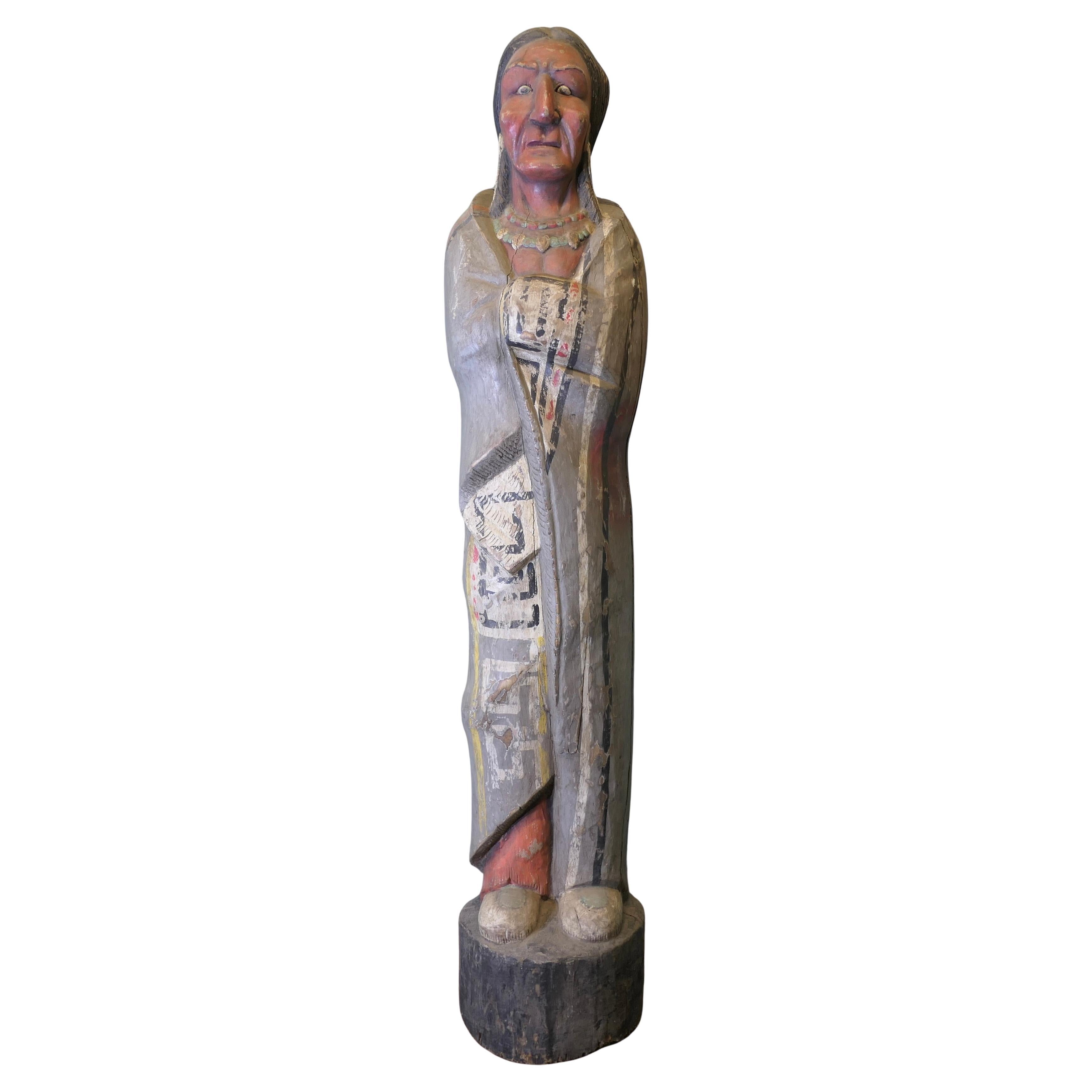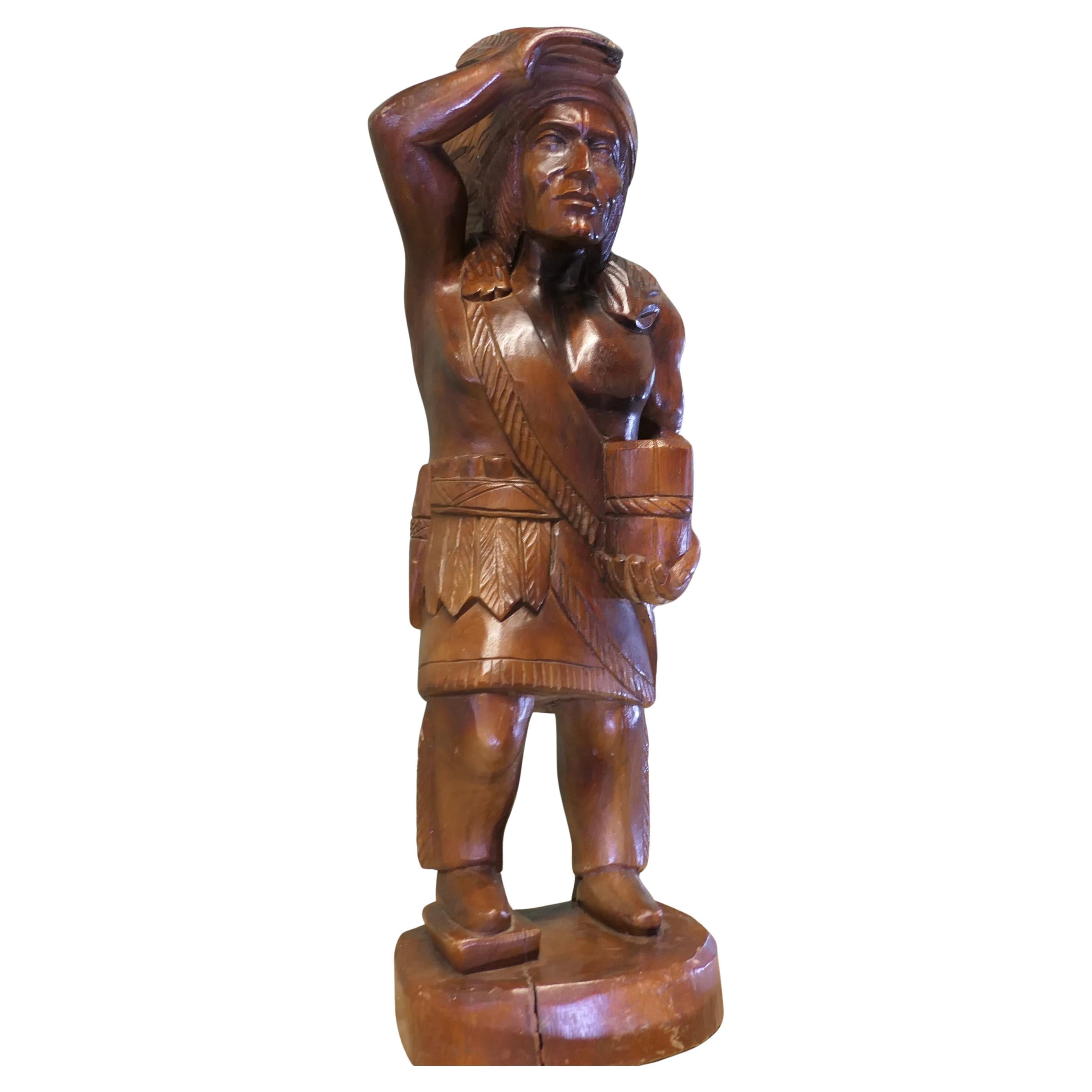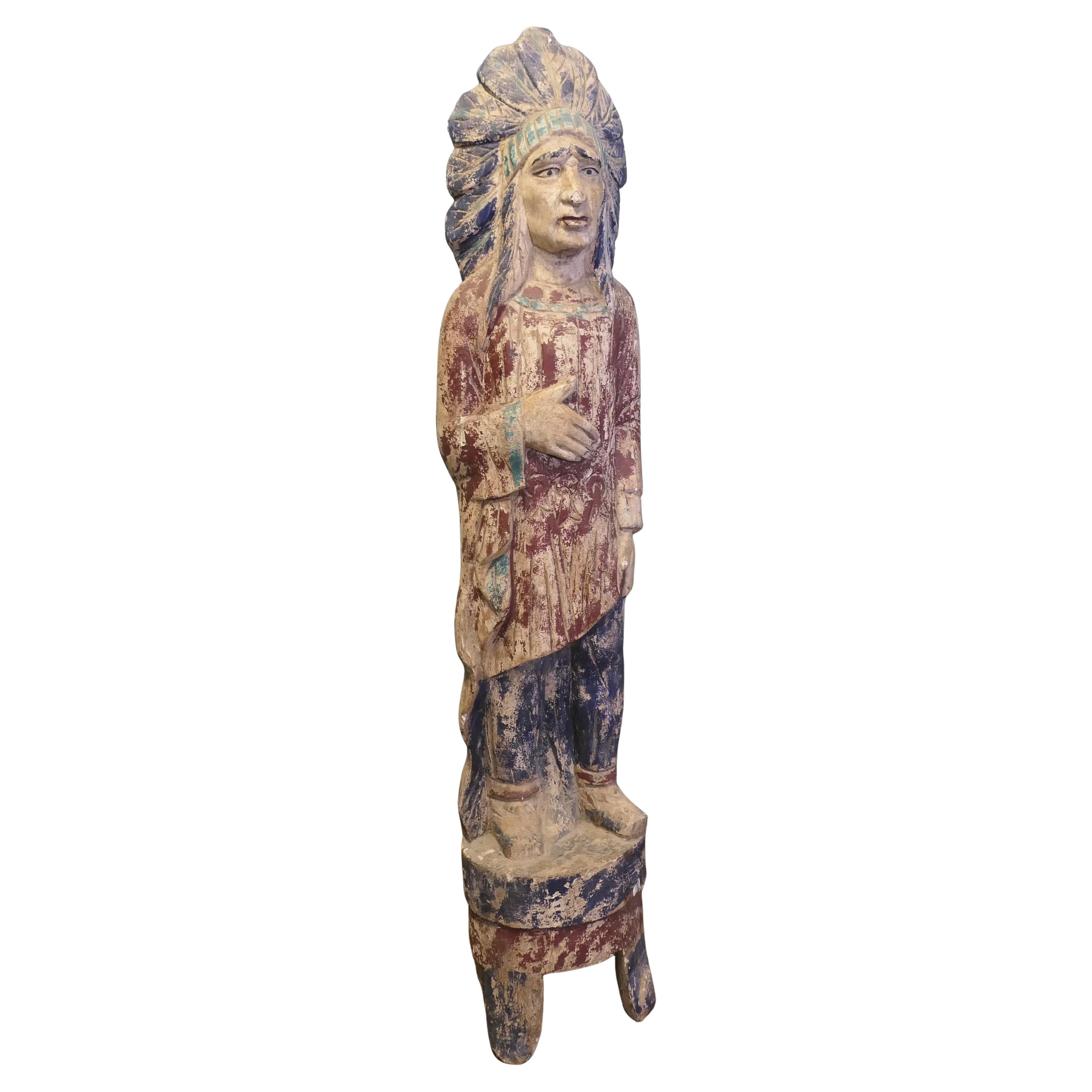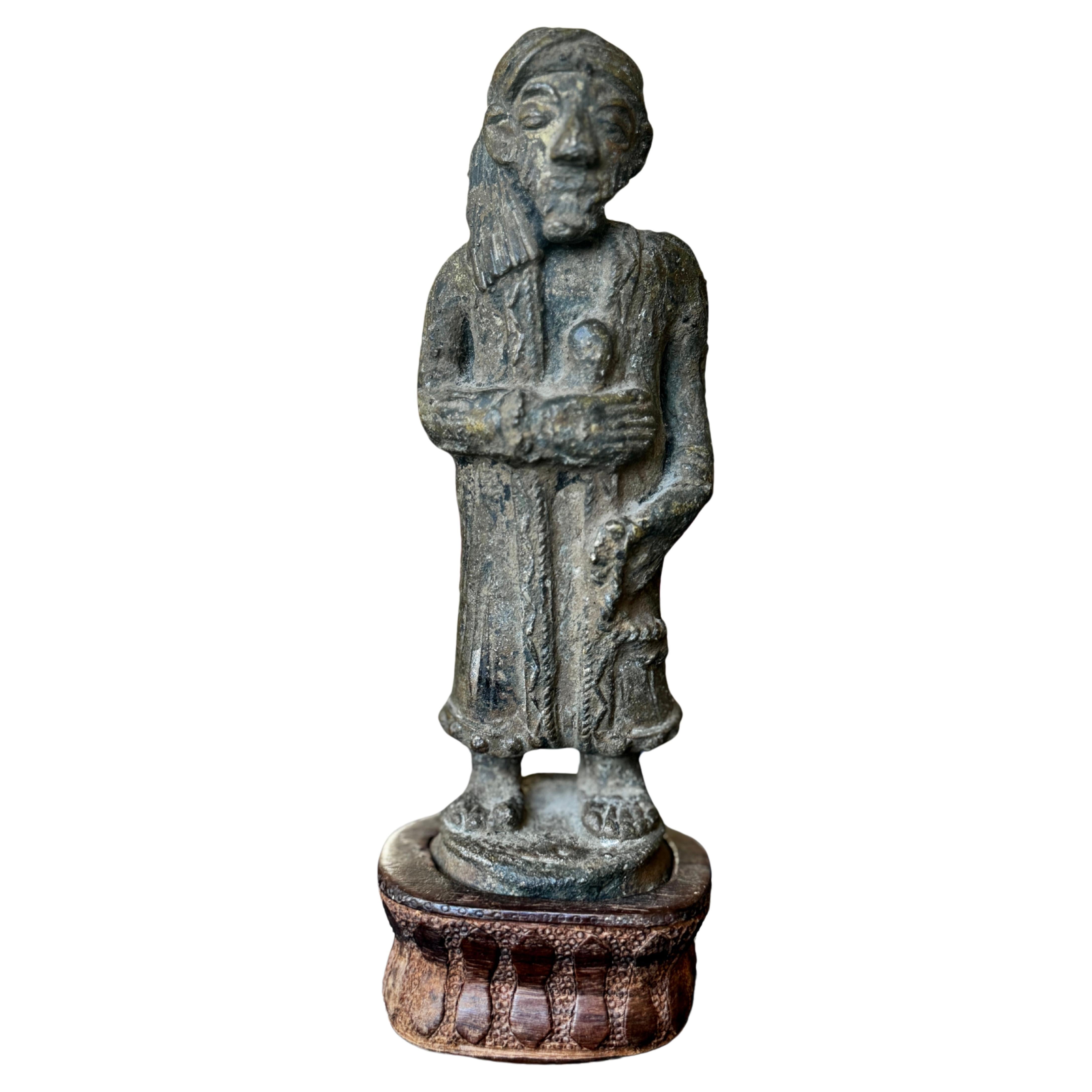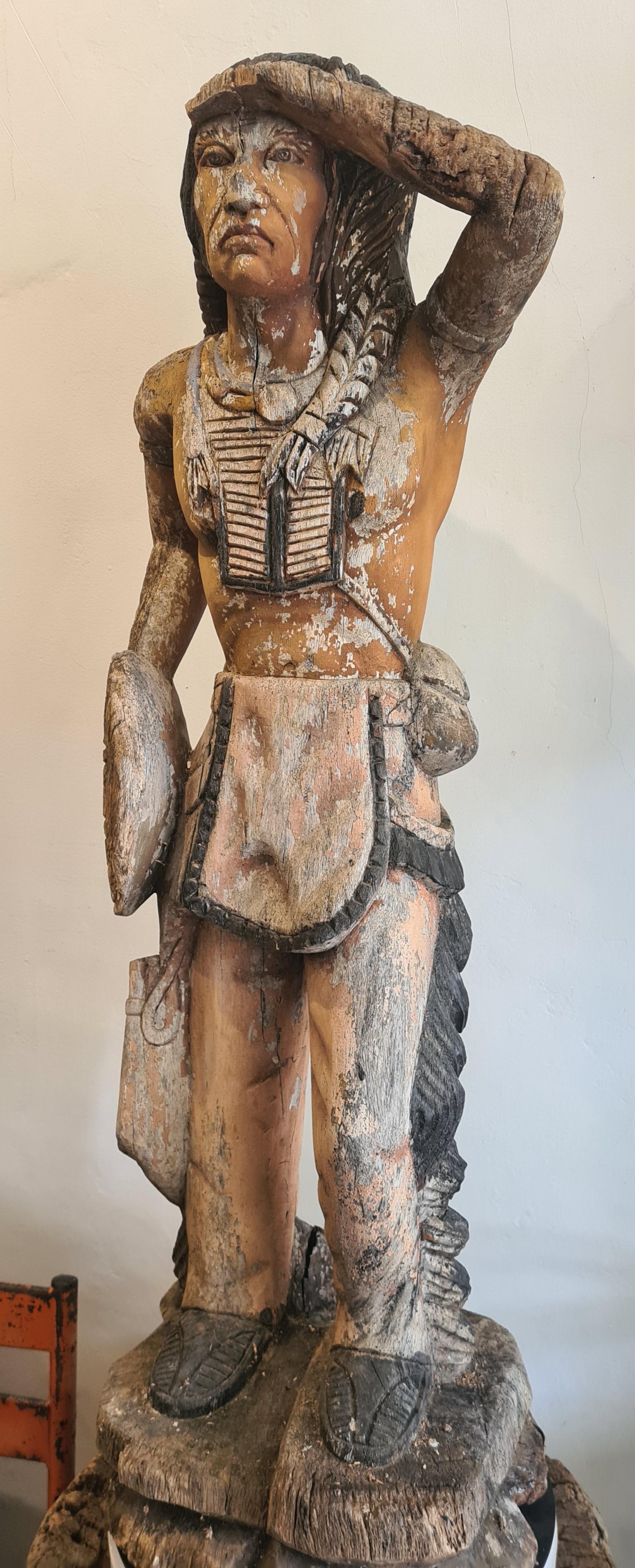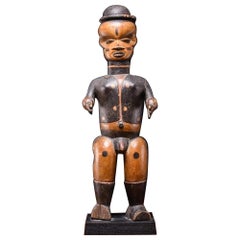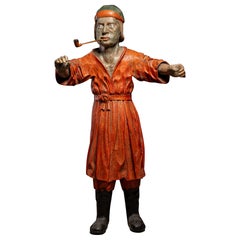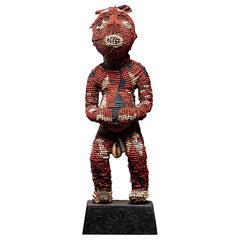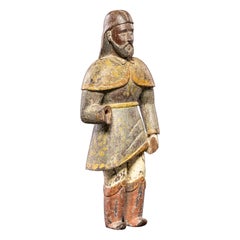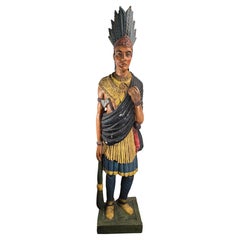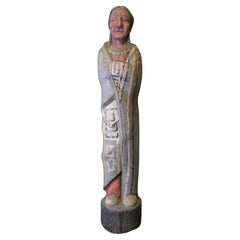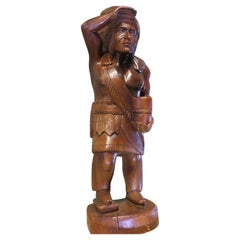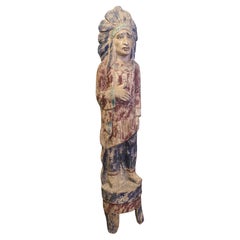Items Similar to 19th C Oakwood Counter Top Cigar Store Indian Statue, Netherlands
Want more images or videos?
Request additional images or videos from the seller
1 of 9
19th C Oakwood Counter Top Cigar Store Indian Statue, Netherlands
$8,212.84
£6,080.40
€6,825
CA$11,371.25
A$12,414.69
CHF 6,508.51
MX$150,781.16
NOK 81,280.73
SEK 76,750.68
DKK 51,960.18
About the Item
The cigar store Indian originated as a tradition, not in the United States but in Europe, where carved “Virginie men,” as Europeans called native Americans, were used for advertising the sale of tobacco, an American crop.
Tobacconists in America picked up the trend to advertise and make their stores distinctive. The folklore about Cigar Store Indians in the late 18th C suggests that they provided a visual marker, much like a barber’s striped pole, for illiterate customers or, in the following century, for the swelling population of immigrants that spoke different languages.
Though these hand-carved statues were once frequent in 19th C cigar stores, original examples are now extremely rare and highly collectable due to the resurgent popularity of cigars and related memorabilia. The wooden Indian was the accepted sign for a tobacco shop by the 1840s, but it was almost gone by 1900, replaced by flat signs with store names. The statue remains in remarkably good condition for its age, with minimal abrasions and wear.
- Dimensions:Height: 20.87 in (53 cm)Width: 5.91 in (15 cm)Depth: 5.91 in (15 cm)
- Materials and Techniques:
- Place of Origin:
- Period:
- Date of Manufacture:Unknown
- Condition:Wear consistent with age and use.
- Seller Location:Leuven , BE
- Reference Number:Seller: 22181stDibs: LU3301128185682
About the Seller
5.0
Vetted Professional Seller
Every seller passes strict standards for authenticity and reliability
Established in 2017
1stDibs seller since 2017
172 sales on 1stDibs
Typical response time: 3 hours
- ShippingRetrieving quote...Shipping from: leuven, Belgium
- Return Policy
Authenticity Guarantee
In the unlikely event there’s an issue with an item’s authenticity, contact us within 1 year for a full refund. DetailsMoney-Back Guarantee
If your item is not as described, is damaged in transit, or does not arrive, contact us within 7 days for a full refund. Details24-Hour Cancellation
You have a 24-hour grace period in which to reconsider your purchase, with no questions asked.Vetted Professional Sellers
Our world-class sellers must adhere to strict standards for service and quality, maintaining the integrity of our listings.Price-Match Guarantee
If you find that a seller listed the same item for a lower price elsewhere, we’ll match it.Trusted Global Delivery
Our best-in-class carrier network provides specialized shipping options worldwide, including custom delivery.More From This Seller
View AllIbibio Anthropomorphic Standing Male Janus Figure, Nigeria
Located in Leuven , BE
This elaborate Janus statue is a rare example of an Ibibio free-standing figure to recall a well-defined ancestor in what seems a European outfit .The Ibibios lend supernatural power...
Category
20th Century Congolese Tribal Art
Materials
Wood
19th C Tobacco Shop Publicity Statue smoking a pipe - polychromed wood.
Located in Leuven , BE
19th C Tobacco Shop Publicity Statue smoking a pipe -polychromed wood.In perfect state -stands tall on its own.
Category
Antique Late 19th Century French Figurative Sculptures
Materials
Hardwood
Bamum Decorative Wooden Ancestor Figure Embroidered with European Glass Beads
Located in Leuven , BE
Bamum Decorative Wooden Ancestor Figure embroidered with European Glass Beads, Grasslands People , Cameroon
Private collection Brussels
These commemorative statuettes ,representing a...
Category
Mid-20th Century Cameroonian Figurative Sculptures
Materials
Wood, Beads
Unusual Filipino representation of Saint Roch in a Spanish colonial style.
Located in Leuven , BE
Unusual representation of Saint Roch in a Spanish colonial style. A Filipino work in exotic wood from the period of evangelization under the Spanish Crown. The type of wood used and ...
Category
Antique Late 17th Century Philippine Figurative Sculptures
Materials
Hardwood
Mother and Child , Cameroon, Mabea, 1920-1930, Provenance R. Caillois-P.Ratton
Located in Leuven , BE
Standing Fang Mabea Maternity of Museum quality, holding a pestle with both her hands. The mother's head is slightly turned to the left, while the child, which she carries on her bac...
Category
Vintage 1920s Cameroonian Figurative Sculptures
Materials
Leather, Wood
Neopolitan Santon in Terracotta Fixed on a wooden base
Located in Leuven , BE
Neapolitan nativity scenes are very different from those seen in churches due to the importance of secular settings. They are not limited to staging the child Jesus surrounded by the holy family. Still, they managed to reproduce the daily life of the Neapolitans of the seventeenth and eighteenth centuries. The elegance of the figuration and the fineness of the execution of these santons also reveals the quality of the know-how of the Neapolitan artisans. The markets, hotels, dances, itinerant vendors, beggars, taverns, various trades, guarding herds, the royal procession and all that was within reach of everyday life or fantasy had their place in the Neapolitan crèches...
Category
20th Century European Figurative Sculptures
Materials
Stone
You May Also Like
Early 20th Century 'The Virginian' Cigar Store Indian
By Samuel Anderson Robb
Located in Kilmarnock, VA
An impressive early 20th-century carved and polychrome painted cigar store Indian standing approximately 6 feet tall to the tip of the feathers. The base features replacement boards—...
Category
Vintage 1920s Folk Art Native American Objects
Materials
Gesso, Wood, Paint
Large Carved Cigar Store Indian, Shop Trade Sign This is a very rare find, he i
Located in Godshill, Isle of Wight
Large Carved Cigar Store Indian, Shop Trade Sign
This is a very rare find, he is a full size American Indian, he is carved from one piece of wood ( a tree trunk, possibly pine )
The...
Category
Vintage 1910s Folk Art Figurative Sculptures
Materials
Wood
Cigar or Tobacco Shop Trade Sign, Carving of an Indian Chief
Located in Godshill, Isle of Wight
Cigar or Tobacco Shop Trade Sign, Carving of an Indian Chief
This charming and very rare piece, this is a fine example of an American favourite the Cigar Store Indian Counter Top Tra...
Category
Vintage 1920s Folk Art Sculptures and Carvings
Materials
Walnut
Carved Cigar Store Native American Indian, Shop Trade Sign
Located in Godshill, Isle of Wight
Carved Cigar Store Native American Indian, Shop Trade Sign
This is a very rare find, he is an almost full size American Indian Chief, he is carved from one piece of wood ( a tree tr...
Category
Vintage 1930s Folk Art Figurative Sculptures
Materials
Wood
Early 20th Century Metal Figure of Man With Turban
Located in San Francisco, CA
Early 20th Century Metal Figure of Man With Turban
Wood base
Possibly Middle-eastern
7.5"H x 2"W x 1.5"D
Category
20th Century Figurative Sculptures
Materials
Metal
Cigar Store Indian, Early 20th Century, Carved Wood With Polychrome Decoration
Located in Cotignac, FR
A 20th Century wood carved male figure, a 'Cigar Store Indian' with original polychrome decoration.
A now controversial subject, but none the less charming rendition, of a native North American man originally probably used as an advertising figure. Wonderful quality of carving capturing the stance of the man looking out to the distance, hair flowing to his back and plait to the side, all the details of his costume, his native dress and hairpipe breastplate (suggesting he is possibly a Comanche) and chest ornament, apron, trousers, mocassins, shield and arrows. The original Polychrome decoration has weathered beautifully as has the wood itself to present a sculpture that would adorn any collection or interior.
Because of the general illiteracy of the populace, early store owners used descriptive emblems or figures to advertise their shops' wares. American Indians and tobacco had always been associated because American Indians introduced tobacco to Europeans. As early as the 17th century, European tobacconists used figures of American Indians to advertise their shops.
Because European carvers had never seen a Native American, these early cigar-store "Indians" looked more like Africans with feathered headdresses and other fanciful, exotic features. These carvings were called "Black Boys" or "Virginians" in the trade. Eventually, the European cigar-store figure...
Category
Mid-20th Century American Realist Figurative Sculptures
Materials
Paint, Wood
$2,890 Sale Price
50% Off
